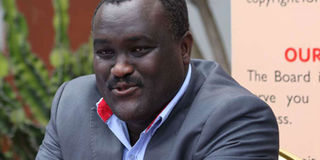Telling silence on intellectual property

Kenya Copyright Board Executive Director Edward Sigei addresses journalists at Meru Slopes Hotel during a seminar for musicians on February 7, 2017. Article 11(2) of the Constitution requires the State to promote intellectual property rights. PHOTO | PHOEBE OKALL | NATION MEDIA GROUP
What you need to know:
- A survey established that copyright industries in Kenya alone contributed six per cent to the GDP.
- There is a need to build the capacity to develop intellectual assets from young talents into a formidable industry.
The election season is with us again and it is a good time as any to share my political wish list with the two major coalitions.
The omission from the two major coalitions’ manifestos of the copyright sector was a big surprise, given that the country has for several decades been claiming to have an ambition of attaining high economic growth driven by intellectual capital.
KNOWLEDGE
The Vision 2030 blueprint is about building an industrialising middle income economy.
It has been said many times that this growth shall be driven by the knowledge economy.
To claim a knowledge economy, the country must invest more in industries that rely less or not at all on commodities and minerals.
ECONOMY
In a survey conducted by World Intellectual Property Organisation (WIPO) in 2009, it was established that copyright industries in Kenya alone contributed six per cent to the GDP and employed over 200,000 people.
The contribution of copyright and related sectors needs to go up for the country to claim Knowledge economy status.
LAW
Article 11(2) of the Constitution requires the State to promote intellectual property rights.
This is reiterated by Article 40(5), which obliges the State to support, promote and protect the intellectual property rights.
Intellectual property that allows the exploitation of the rich talents and research output offers Kenya an opportunity to quickly achieve its developmental objectives.
POLICY
However, to date, the country does not have an intellectual property policy to enable it to change its prospects.
But there is a draft that can be adopted within the shortest time possible.
The policy should place intellectual property at the mainstream of the National Development Plan if all the investments in research are to result in indigenous technologies.
ADMINISTRATION
The development of a knowledge economy requires structures to support the development of talents and high quality research.
The three Intellectual Property offices of Kenya are based in Nairobi with Kenya Plant Health Inspectorate Services (Kephis) the most prominent.
Although efforts have been made to enable citizens to access the Kenya Copyright Board (Kecobo) and Kenya Industrial Property Institute (Kipi) services through technology, people in the counties deserve to have IP offices closer to them so that they can harness the results of their research and development.
TALENT
There is a need to build the capacity to develop intellectual assets from young talents into a formidable industry by creating a cadre of managers to support artists and to earn sustainable incomes.
Having practitioners in every county and constituency will make a great difference, especially now that the Studio Mashinani programme is fully operational.
The application of tax incentives (waiver) on materials and equipment used by artists can kick start the sector.
BOOKS
The introduction of Value Added Tax (VAT) on books has contributed to the poor pupil-to-book ratio and the increasing piracy of set books.
A review of the impact of the tax is long overdue.
The issue of VAT on publishing poses a threat to local publishing.
HERITAGE
The Protection of Traditional Knowledge and Cultural Expressions Act, 2016, was enacted with the aim of securing the heritage and cultural manifestations of Kenyans as per Article 11 of the Constitution.
However, the legislation remains in a limbo since the National Assembly did not provide an administrator.
To operationalise the Act, Parliament ought to re-look at it and offer it a home at a state department/agency that can execute it.
FUNDING
In an environment rife with bio piracy and theft of intellectual heritage, this is a very urgent matter.
Kenya deserves its place as a regional leader in technology and art but to maintain this position requires investment and good policies.
While a lot has been done in the last five years, there is a need for a comprehensive plan for the arts and research sector backed by well-funded institutions, if Kenya is to remain a competitive economy.
Mr Sigei is the executive director, Kenya Copyright Board




